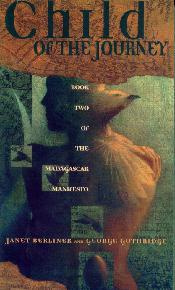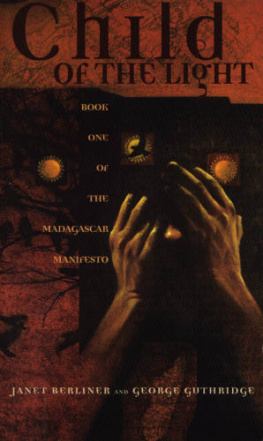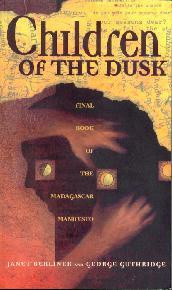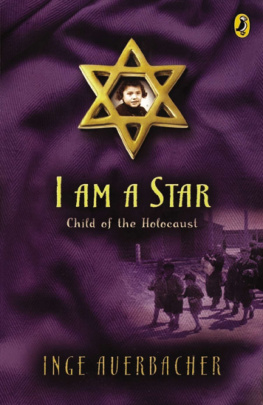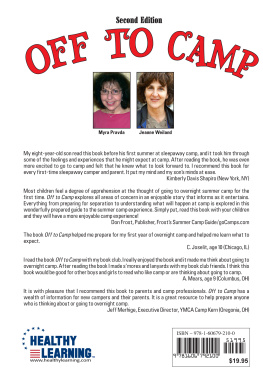Child of the Journey
By Janet Berliner & George Guthridge

Crossroad Press & Macabre Ink Digital Edition
Copyright 2010 by Janet Berliner and George Guthridge
Cover Design by Neil Jackson
LICENSE NOTES:
This e-book is licensed for your personal enjoyment only. This e-book may not be re-sold or given away to other people. If you would like to share this book with another person, please purchase an additional copy for each person you share it with. If you're reading this book and did not purchase it, or it was not purchased for your use only, then you should return to your vendor of choice and purchase your own copy. Thank you for respecting the hard work of this author.
ALSO BY JANET BERLINER FROM CROSSROAD PRESS:
NOVELS:
Child of the Light (Book 1 of the Madagascar Manifesto)
Children of the Dusk (Book 3 of the Madagascar Manifesto)
Sols Song
What You Remember I Did (with Melanie Tem)
PART I
"What is the price of five sparrows? A couple of pennies? Not much more than that. Yet God does not forget a single one of them."
-- Luke 12:6
BERLIN
April 1938
W as there any vestige left of the girl-woman who had enchanted the boys that night in Kaverne, Miriam wondered, or had the shadow of these last years erased it all?
Tilting her head, she inspected herself in the ornate mirror of her childhood. She had twisted her hair into a dancer's chignon and decorated it with a sprig of lilac, as she had done the night she first met Erich and Solomon. Leaning closer to the mirror, she inspected the inevitable fine lines that proved the passage of the years. She was more than twice the age now that she had been then. How was that possible, when only yesterday she had been fresh and young and fifteen?
Yesterday, and forever ago.
Time was a vagabond, at once a memory saboteur and a comforter, like an eiderdown that keeps you cozy and warm while it makes you weep and your skin itch.
Here, alone in her old room at what had once been her family estate, she felt relatively safe. She was aware of the comings and goings of Erich's Abwehr colleagues, and of occasional visits by Hermann Gring and Paul Joseph Goebbels, but when she stood on her balcony and stared out across the gardens, she saw only the quietly suburban, upper-crust veneer of the Grnewald. Erich kept to his own quarters, rarely intruding upon her privacy except by invitation, and she had plenty of time for solitude.
An excess of time, probably, judging by how often she caught herself avoiding the present and dwelling on a past that was, at least for the moment, lost to her, and a future that had become increasingly inaccessible.
As if venting her anger on it would somehow help, she picked up her hairbrush and flung it across the room. It thudded against the wall, bounced on the carpet, and lay there like the inanimate object it was.
The futility of the gesture served only to increase her misery. The last thing in the world she wanted to do was attend a party honoring Adolph Hitler, she thought, contemplating her partially dressed image in the mirror. It would be delusional to believe that the Fhrer's birthday celebration would be anything but a stiff and formal dinner party, with nary a guest on the list who could provide her with either entertainment or intellectual stimulation.
So she had dallied too long. Now she was sure to be late, which would infuriate Erich, and cause the evening to turn out more unpleasant yet.
She retrieved her brush from the carpet and sat back down in front of the mirror, but instead of busying herself with the business of dressing, she allowed herself to drift sixteen years into the past, to a dinner party which had been anything but dull.
"Wenn der weisse Flieder wieder Blht ," she sang softly, reprising the song from her memories of that night at Kaverne, the cabaret her grandmother had built in the converted basement beneath a fur shop. It was an unusual place for a nightclub, across the street from the block of flats where Erich Weisser and Solomon Freund lived, and next door to their parents' cigar shop. Only she had not known any of that at the time. Nor would she have cared if she had known. They were around twelve, going on thirteen. Mere boys . She, on the other hand, had been fifteen, just back from dance training in America, her head filled with visions of stardom. Still, she knew enough to be grateful to her grandmother, Oma Rathenau, and to what the social gossips called her grandmother's crusade to bring respectability to Berlin's entertainment industry. Nor did she resent the suggestion that the real purpose of the cabaret was to showcase her talents. Why not? She was the old lady's granddaughter and the niece of Germany's newly appointed Foreign Minister, not to speak of being the heir to the Rathenau fortune.
What would her life have been like now, Miriam wondered, had she not performed at Kaverne's pre-opening dinner party? There might have been no Solomon in her life. There certainly would have been no Erich, for it was there that she had met both of them: Solomon, clutching his cello and dressed as if for his own bar mitzvah; and Erich, hair slicked-back, wearing pressed trousers, a white shirt with starched, rounded collar, and his father's silk paisley cravat.
From strangers, to acquaintances, from friends to intimates. It was a strange, wonderful, and terrifying progression, fraught with the best and the worst that human nature had to offer.
Enduring the customary pain that accompanied even the most fleeting reminder of Sol, she opened one of the drawers of the tiny porcelain music box he had won for her in the ring-toss booth at Luna Park.
"Glhwrmchen, Glhwrmchen, glimm're.... Shine little glowworm, glimmer, glimmer...." The Paul Lincke song was one of Solomon's favorites, the first of the two songs she sang at Kaverne. There, for the first time, she met Erich. It was not until later that night that she actually met Solomon, Erich's brother-in-blood and, now, her dearest husband-of-the-heart.
How disappointed she had felt at the tepid applause of the audience that night, though it was what she had learned to expect from the Germans, disciplined, and so unlike the Americans, with their wild enthusiasms and their appreciation for youth and beauty.
Smiling at her instantaneous fifteen-year-old rebellion against the self-control of her audience, she remembered....
...Tossing aside her shawl, she erupted into a cancan, whirling, kicking, repeating the routine until, with a suddenness calculated to send an ache through the groin of the shy-looking bespectacled young man who had just crept into the cabaret, and to shock the other boy who had risen to his feet and was clapping wildly, she dropped into a split. She was playing to him and to Solomon, and they both repaid her with naked adoration, staring at her as if she were the beautiful film star, Lilian Harvey, in the flesh.
Her diminutive uncle raised a black eyebrow and blew a perfect smoke ring into the air before applauding his favorite niece's performance. She smiled prettily at him and at her bejeweled old grandmother as the band began to play and couples gravitated toward the dance floor.
She approached her uncle's table. Having introduced herself to Erich's parents and exchanged a few pleasantries with them--the woman looked a little too nervous; the man, at best, uncomfortable, his nose red, as if he had been drinking too much, and his eyes hard--she glanced sideways at the boy. He was good-looking, not like either of his parents, yet he had his father's square jaw and his mother's light hair.

